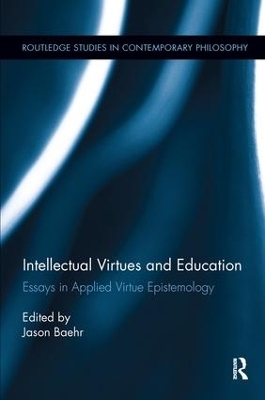
Intellectual Virtues and Education
Routledge (Verlag)
978-1-138-09869-5 (ISBN)
With its focus on intellectual virtues and their role in the acquisition and transmission of knowledge and related epistemic goods, virtue epistemology provides a rich set of tools for educational theory and practice. In particular, characteristics under the rubric of "responsibilist" virtue epistemology, like curiosity, open-mindedness, attentiveness, intellectual courage, and intellectual tenacity, can help educators and students define and attain certain worthy but nebulous educational goals like a love of learning, lifelong learning, and critical thinking. This volume is devoted to exploring the intersection between virtue epistemology and education. It assembles leading virtue epistemologists and philosophers of education to address such questions as: Which virtues are most essential to education? How exactly should these virtues be understood? How is the goal of intellectual character growth related to other educational goals, for example, to critical thinking and knowledge-acquisition? What are the "best practices" for achieving this goal? Can growth in intellectual virtues be measured? The chapters are a prime example of "applied epistemology" and promise to be a seminal contribution to an area of research that is rapidly gaining attention within epistemology and beyond.
Jason Baehr is Professor of Philosophy at Loyola Marymount University, USA. From 2012-2015, he served as director of The Intellectual Virtues and Education Project and helped found the Intellectual Virtues Academy of Long Beach.
I. Which Intellectual Virtues Are Central to Education? 1. Introduction: Applying Virtue Epistemology to Education Jason Baehr 2. Open-Mindedness, Insight, and Understanding Wayne D. Riggs 3. Why Should We Educate for Inquisitiveness Lani Watson 4. Educating for Intellectual Humility Ian James Kidd 5. Skepticism and Intellectual Humility as a Civic Virtue Allan Hazlett II. How Are Intellectual Virtues Related to Other Educational Aims and Practices? 6. Critical Thinking and the Intellectual Virtues Harvey Siegel 7. Intellectual Virtue, Extended Cognition, and the Epistemology of Education Duncan Pritchard 8. Testimonial Virtue Emily Robertson 9. Problems of Assessment in Educating for Intellectual Virtues Ben Kotzee III. How Can Intellectual Virtues Be Fostered In the Classroom? 10. Responsibilist Virtues in Reliabilist Classrooms Heather Battaly 11. Learning Intellectual Humility Robert C. Roberts 12. Toward Intellectually Virtuous Discourse: Two Vicious Fallacies and the Virtues that Inhibit Them Robert K. Garcia and Nathan L. King 13. A Therapeutic Approach to Intellectual Virtue Formation in the Classroom Steven L. Porter 14. Conclusion: Themes and Questions in Intellectual Character Education Jason Baehr
| Erscheinungsdatum | 01.07.2017 |
|---|---|
| Reihe/Serie | Routledge Studies in Contemporary Philosophy |
| Verlagsort | London |
| Sprache | englisch |
| Maße | 152 x 229 mm |
| Gewicht | 385 g |
| Themenwelt | Geisteswissenschaften ► Philosophie ► Erkenntnistheorie / Wissenschaftstheorie |
| Geisteswissenschaften ► Philosophie ► Ethik | |
| Sozialwissenschaften ► Pädagogik ► Allgemeines / Lexika | |
| Sozialwissenschaften ► Pädagogik ► Bildungstheorie | |
| ISBN-10 | 1-138-09869-8 / 1138098698 |
| ISBN-13 | 978-1-138-09869-5 / 9781138098695 |
| Zustand | Neuware |
| Haben Sie eine Frage zum Produkt? |
aus dem Bereich


